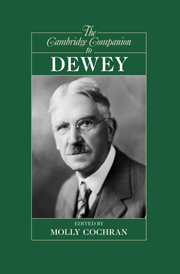Book contents
- Frontmatter
- Introduction
- 1 The making of a democratic philosopher: the intellectual development of John Dewey
- 2 Dewey’s epistemology
- 3 The naturalism of John Dewey
- 4 Dewey’s logic of inquiry
- 5 The primacy of practice in Dewey’s experimental empiricism
- 6 Cognitive science and Dewey’s theory of mind, thought, and language
- 7 John Dewey and action
- 8 Dewey’s moral philosophy
- 9 Ethics as moral inquiry: Dewey and the moral psychology of social reform
- 10 Dewey and pragmatic religious naturalism
- 11 Dewey’s aesthetics
- 12 Dewey’s philosophy of education: a critique from the perspective of care theory
- 13 Dewey’s vision of radical democracy
- 14 Dewey as an international thinker
- Bibliography
- Index
12 - Dewey’s philosophy of education: a critique from the perspective of care theory
Published online by Cambridge University Press: 28 September 2010
- Frontmatter
- Introduction
- 1 The making of a democratic philosopher: the intellectual development of John Dewey
- 2 Dewey’s epistemology
- 3 The naturalism of John Dewey
- 4 Dewey’s logic of inquiry
- 5 The primacy of practice in Dewey’s experimental empiricism
- 6 Cognitive science and Dewey’s theory of mind, thought, and language
- 7 John Dewey and action
- 8 Dewey’s moral philosophy
- 9 Ethics as moral inquiry: Dewey and the moral psychology of social reform
- 10 Dewey and pragmatic religious naturalism
- 11 Dewey’s aesthetics
- 12 Dewey’s philosophy of education: a critique from the perspective of care theory
- 13 Dewey’s vision of radical democracy
- 14 Dewey as an international thinker
- Bibliography
- Index
Summary
Care theorists owe much to John Dewey and his prescriptions for progressive education. Although there are problems for feminists in pragmatism, they may be remedied. As Virginia Held has said, “[w]e would . . . have to transform pragmatism.” We would have to enlarge (or at least elaborate further) the pragmatist conception of experience; in particular, we would have to include women's experience in a careful and deliberate way. As we examine Dewey's ideas on education, we find much to appreciate. But there seems to be a pervasive lack of attention to relations as they are described in care theory. Dewey has much to say about the individual and the community, but he rarely digs beneath the two to locate what care theorists take to be ontologically basic - the dyadic relation - and his discussion of thinking may be too narrowly confined to scientific thinking. In this brief and appreciative critique, I look at five important topics in his philosophy of education: the child, the curriculum, learning and inquiry, democracy, and moral education.
- Type
- Chapter
- Information
- The Cambridge Companion to Dewey , pp. 265 - 287Publisher: Cambridge University PressPrint publication year: 2010
- 6
- Cited by



